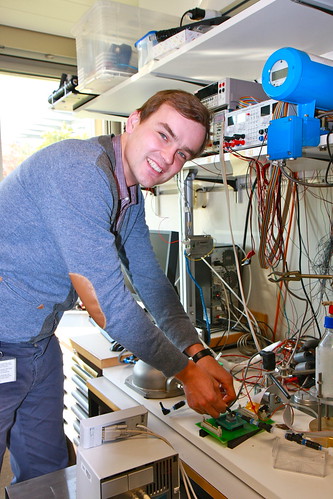IBM scientist Werner Escher received the 2011 HILTI Award for innovative research for his outstanding PhD thesis on new liquid cooling technologies for microprocessors. The renowned technical university ETH Zurich issues this award every year in recognition of a thesis or other research paper in the fields of physics or engineering that excels in combining extraordinary scientific research with practical use.
 |
| Photo Credit: ETH Zurich/ Oliver Bartenschlager |
Werner, currently a research staff member at IBM Research – Zurich, studied mechanical engineering and wrote his PhD thesis entitled "Ultra Thin High Efficiency Heat Sinks with Water or Nanofluid for Electronics" at ETH Zurich and IBM Research – Zurich between 2006 and 2009.
His thesis describes the development of a high-performance liquid-cooled microchannel heat sink to mitigate the daunting issue of efficiently cooling today’s microprocessors as well as those of future generations.
Werner is a member of the research team that pioneered Aquasar, a hot-water-cooled supercomputer. Installed at ETH Zurich, Aquasar uses microchannel liquid coolers to cool the chips with 60°C hot water, which is then redirected to heat the campus buildings. This reduces energy consumption for cooling by 40% and lowers the supercomputer’s carbon footprint by 85% compared to traditional air-cooled systems.
We interviewed Werner about his research, his experience as a graduate student at an industrial research lab and why he chose a career in science and technology.
Can you explain the major issues that you address in your research?
Microprocessors dissipate large amounts of energy with high heat flux densities that are several times higher than those of a hotplate. The goal of this work was to develop new means to remove these very high heat fluxes efficiently while minimizing the volume occupied by the cooler itself. This was achieved by implementing microchannels into the heat-dissipating chip and introducing a hierarchical network that distributes the liquid efficiently to the individual microchannels and minimizes the power required to pump the liquid through the microchannels.
What makes this work so fascinating?
It’s great to see how it all comes together in the end. At the beginning you generate some initial ideas, then you refine them based on calculations and numerical simulations to identify the most promising solutions. It’s exciting when an experiment finally works and confirms your initial predictions.
Have you always known you would pursue a career in research?
I was always interested in new ideas and technologies in general and how they can contribute to fulfilling a given functionality. This was also what motivated me to study mechanical engineering because it nicely combines basic research with the final application.
Any advice to students on how to achieve outstanding results? What’s your secret?
That’s difficult to say. In the end you need to find your own path. I think it’s important in general to be curious, patient and a good team player.
What made you decide to conduct your PhD work at IBM Research – Zurich, an industrial research lab?
Well, as I said, I’ve always been very interested in seeing the practical impact of research. That’s why I preferred to conduct my PhD work at an industrial research lab. It gives you clear feedback on what the market requires and where the bottlenecks of the current solutions are.
Would you recommend it to other students?
For me it was the right decision to conduct my PhD work here at the IBM Research – Zurich Lab. I had the opportunity to work in a team of scientists with years of experience and who are top experts in the field. Discussions within the team were especially constructive, and the help and support I received enabled me ultimately to achieve the results of this project.
(Laughs) Oh no, I didn’t know this was going to be a job interview. But seriously, I hope to continue to generate strong results together with my team members and to transfer more of these technologies into products.
What do you consider the most important factors for successful research?
An open-minded environment, stimulating discussions within a creative team, an outstanding infrastructure and sufficient resources.
As a mechanical engineer you are part of a very diverse and multi-disciplinary science project. Can you describe your experience?
I highly appreciate working in interdisciplinary teams where the individual members have different vantage points towards the challenges we face. I think this opens up new perspectives and gives you the opportunity for personal development. And ultimately, it leads to more complete and better solutions.
What has been the most surprising or decisive moment in your research career so far?
Definitely: Receiving the Hilti award.
What does the award mean to you?
It is an honor for me to receive this prestigious award and I would like to take this opportunity to thank my supervisors at ETH and IBM, Prof. Dimos Poulikakos and Dr. Bruno Michel for their continuous support and advice.
What do you do when you are not in your lab?
I enjoy spending time with my family and friends, doing sports or just relaxing and reading a good book.



It would be a great achievement for you, there are lot of peoples who are engaged in such thesis and experimenting but all are not luckier to get success like you. It's great that your experiments finally worked out.
ReplyDelete